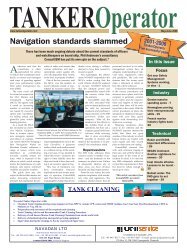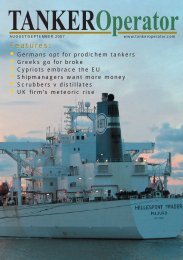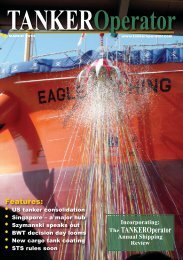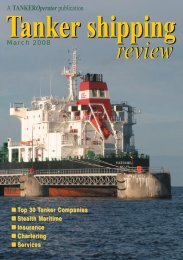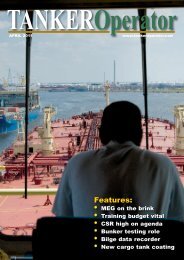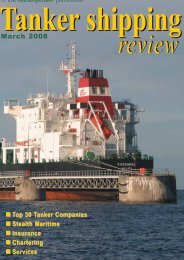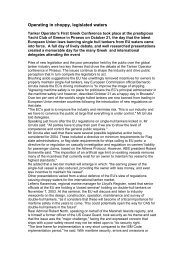Features: Features: - Tanker Operator
Features: Features: - Tanker Operator
Features: Features: - Tanker Operator
Create successful ePaper yourself
Turn your PDF publications into a flip-book with our unique Google optimized e-Paper software.
MARKETS - SEAFARERS<br />
A seafarers lot -<br />
is it a happy one?<br />
The results of a research project, the first in a series entitled<br />
‘Life at Sea Surveys 2007-2008’ * was recently published by<br />
Shiptalk Recruitment and Gilmour Research and makes interesting reading.<br />
Asurvey conducted<br />
during October and<br />
November last year<br />
asked serving<br />
seafarers to fill in a 30-question<br />
multiple choice document online<br />
on the themes of 'attraction and<br />
retention'.<br />
Of the 229 respondents, around<br />
2.6% were female, which broadly<br />
reflected the gender split in<br />
seafarers today, Shiptalk said. The<br />
returns showed that they were an<br />
ageing profile of senior officers,<br />
43.2% of which had spent more<br />
than 21 years at sea. Most<br />
(55.4%) entered service between<br />
the ages of 16-19 and 57.7% went<br />
strait from school or college.<br />
What Shiptalk found more<br />
interesting was the percentage of<br />
seafarers who went to sea<br />
between the ages of 20-25. This<br />
may have been due to a recent<br />
push of graduate training schemes<br />
as it was noted that some 23.1%<br />
went strait from university.<br />
The fact that only 5.7% were<br />
over 26 years old when first<br />
going to sea may be indicative of<br />
the shortage of officers and the<br />
need to recruit from those who<br />
are looking for an alternate career<br />
at sea later in life.<br />
When studying how seafarers<br />
learnt about a career at sea a huge<br />
42% cited advice from family and<br />
friends. Shiptalk said it recently<br />
attended a conference at which<br />
the question was asked of the<br />
delegates - raise your hands if<br />
you would recommend a career at<br />
sea. Not one person responded.<br />
About 15.8% of the respondents<br />
had received advice from school<br />
or university careers advisors,<br />
04<br />
suggesting that sea awareness<br />
programmes such as those run by<br />
Sea Vision and the Merchant Navy<br />
Training Board were taking effect,<br />
Shiptalk said. Another 8.5% of<br />
those who answered the survey<br />
learnt of the opportunity to go to<br />
sea through the internet. However,<br />
this source of information has only<br />
been around for the past five to 10<br />
years.<br />
Money<br />
Money and the possibility of a<br />
tax free status was a motivating<br />
factor in 31.8% of the responders.<br />
In the second survey in the series<br />
remuneration will be looked at in<br />
greater detail, Shiptalk said. The<br />
third will cover training.<br />
“<br />
When applying for jobs, 35.4%<br />
went strait to the companies that<br />
they wanted to work for. However,<br />
20 years ago this was easier as the<br />
shipping industry today is more<br />
fragmented. Indeed, 16.6% said<br />
they had applied through their<br />
local crewing manager. Perhaps<br />
most worrying was the fact that<br />
3.9% said they had paid for their<br />
first seagoing post.<br />
More than half (52.8%) said<br />
that they had to pay for their presea<br />
training, which would<br />
obviously put would be<br />
applicants off, or drive them into<br />
the hands of unscrupulous<br />
employers who would loan the<br />
money to the trainees at<br />
exorbitant rates.<br />
No less than 45% said that they<br />
had looked forward to a long career<br />
at sea when first joining, achieving<br />
the highest rank and retiring with a<br />
pension. Some 49.3% were<br />
motivated to become masters or<br />
chief engineers and reach the top of<br />
their chosen profession. However,<br />
the remainder looked at this career<br />
move as a more temporary<br />
opportunity and/or a stepping stone<br />
to a to another career or life choice.<br />
Salary was cited by 31.5% of<br />
the respondents as the most<br />
important factor, which kept them<br />
at sea. However, more<br />
reassuringly was the 20% who<br />
quoted 'job satisfaction', which<br />
was on a par with leave time<br />
(19.3%). This was valued more<br />
highly than the need for paid<br />
leave (12%). Promotional<br />
prospects only came in at 6.1%,<br />
but this may have been due to the<br />
fact that 76.4% of all respondents<br />
had already reached senior officer<br />
rank. The old chestnut of 'seeing<br />
the world' dropped to just 8%, a<br />
fall of 10% on when the<br />
respondents first went to sea.<br />
As for employment benefits,<br />
personal medical/health insurance<br />
plans were received by 35.4% of<br />
all respondents with 20.5%<br />
having those benefits extended to<br />
their families. However, 17%<br />
received no additional benefits.<br />
Around 63% opted for a pension<br />
and 56.3% wanted medical/health<br />
insurance for their families.<br />
Given today's living conditions,<br />
the internet was the most<br />
important on board facility<br />
coming in at 70.7% of all<br />
respondents, but only 38% had<br />
access to it. However, over 60%<br />
claimed to be able to receive and<br />
send e-mails. As for on board<br />
telephones, 65.1% claimed access<br />
to a phone and 36.2% access to<br />
satellite television.<br />
When considering whether to<br />
join a particular vessel, 45% said<br />
the age and condition were<br />
[...at a recent] conference, the question was asked<br />
of the delegates - raise your hands if you<br />
would recommend a career at sea.<br />
Not one person responded.<br />
”<br />
paramount, while 38.9% cited the<br />
on board living conditions.<br />
Timely salary payments came in<br />
third at 32.3%.<br />
Despite the rhetoric over<br />
piracy, criminalisation, paper<br />
work, fatigue, lack of shore leave<br />
as deterrents to not going to sea,<br />
67.6% quoted being apart from<br />
friends and family as the worst<br />
case scenario.<br />
TO<br />
*Bound copies of the full<br />
report are available at £25<br />
from www.shiptalkjobs.com<br />
which also houses a free read<br />
only version. Corporate<br />
copies are also available.<br />
TANKER<strong>Operator</strong> March 2008



